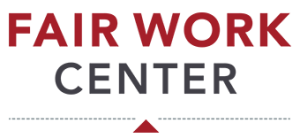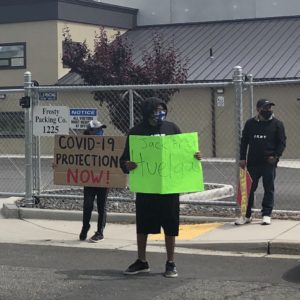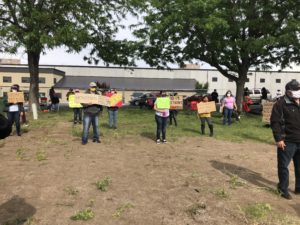Supporting workers during this crisis

It’s a time of unparalleled crisis for workers across Washington and across the country. Since the pandemic took hold back in March, Fair Work Center has supported workers organizing for health, safety, and justice. Fruit packing house workers in Yakima are standing up for their health and calling out longstanding abuses in the workplace. Hundreds of thousands of workers in Washington State are unemployed or facing dangerous work conditions, and many are struggling to pay bills and feed their families. Amidst it all, millions of people across the nation are joining in the transformative movement for Black lives, raising their voices in support of a sweeping vision for racial and economic justice.
Read on to learn about the ways that Fair Work Center is supporting workers during this crisis:
Yakima workers strike for safety and health
“As workers, we all have rights and we should assert our rights, because if we don’t assert them ourselves, the employers aren’t going to respect them…I’ll stay on strike until they give us a good response. I’ll stay here until they tell us that they’ll give us a wage increase, until they say that they won’t retaliate against us, that they won’t humiliate us – all of that.”
– Striking Yakima worker
“I don’t see how they’re protecting our health. I’m one of the many who was infected with the coronavirus….I let my immediate supervisors know once I knew I was sick with the virus. But they never told any of my coworkers that I was even sick, that they had been exposed.”
– Striking Yakima worker
More than one hundred workers at the Allan Bros fruit packing house walked out on strike in May after 14 co-workers tested positive for COVID-19 and the company didn’t take the appropriate steps to keep people safe. Their call for hazard pay and COVID safety protections quickly spread across the Yakima Valley, with more than 1000 workers joining picket lines at seven different packing houses.
These workers took action together to address unsafe working conditions and years of abuse. Click to hear from workers in their own words about the dangerous conditions that led them to walk off the job.
A coalition of community organizations – including Familias Unidas, Community to Community Development, Washington State Labor Council, Columbia Legal Services, and Fair Work Center – quickly coalesced to support workers’ calls for a safe and healthy workplace. Fair Work Center supported workers in filing more than 180 health and safety complaints with the Department of Labor & Industries and provided know-your-rights trainings on the strike lines.
It’s been decades since a strike wave like this shook our state. Workers ended their strikes after managers at several warehouses negotiated directly with workers, with many companies promising to improve safety conditions. Unfortunately, many workers aren’t seeing the agreed-upon changes and are facing retaliation from management. That’s why some workers are now organizing to form an independent labor union to permanently increase their power in the workplace, raise pay, and address safety issues in the packing houses.
Fair Work Center is partnering with some of the workers who led the strikes to create a promotora program, which will train workers to facilitate health and safety workshops for their coworkers. This means that more workers will be able to identify violations of their rights, take collective action, and get connected with legal assistance during this time of crisis.
Know Your Rights during the coronavirus crisis
Workers across Washington are facing severe impacts of the coronavirus crisis: layoffs, hours cut, issues with sick pay and childcare, and hazards on the job. Fair Work Center & Working Washington have created a guide to help you navigate your rights and the benefits you can access.
The guide includes information about your rights and benefits under pre-existing WA laws, and new rights and benefits that are available due to emergency measures. The page is updated frequently as we learn of new emergency measures and programs.
Visit the page to learn more about your rights during this crisis.
In solidarity with the movement for Black Lives
Our organization stands in solidarity with the movement for Black lives and the powerful protests in Seattle, across Washington, and all across the country. We join the call for dignity and justice for George Floyd, Breonna Taylor, Tony McDade, Ahmaud Arbery, Sean Reed, James Scurlock, David McAtee, Charleena Lyles, and the thousands of other Black lives taken by police officers and white supremacist violence.
We know that there is no worker justice without racial justice. Workers’ rights organizations like ours must prioritize and raise up the issues faced by Black workers in and out of work. Many of our community members are directly impacted by racism and police violence, and our movement must support Black organizers who are on the ground fighting for justice.



